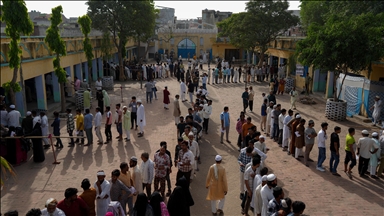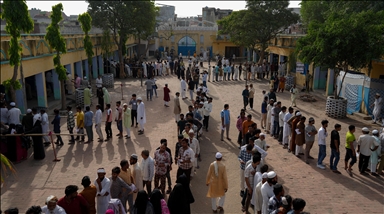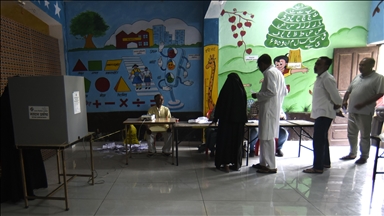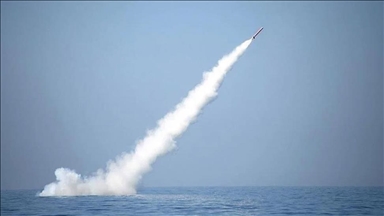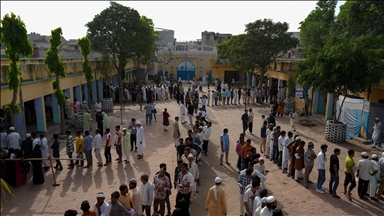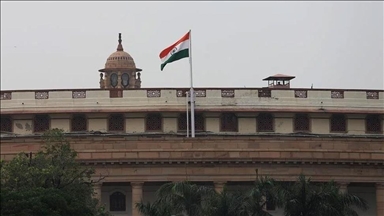Slim chances of thaw in Pakistan-India tensions after regime change in Islamabad
Experts do not foresee immediate detente between nuclear rivals
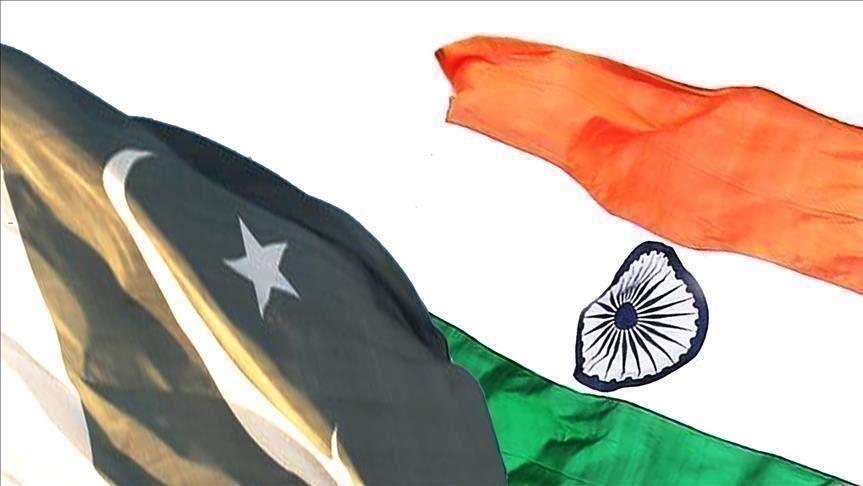
KARACHI / NEW DELHI
Pakistani and Indian political observers do not foresee any immediate easing of heightened hostilities between the two nuclear neighbors despite a recent regime change in Islamabad.
The already fraught relations between the two countries further plummeted in August 2019, when New Delhi stripped the disputed Jammu and Kashmir valley of its longstanding semiautonomous status.
The controversial move instantly prompted Islamabad to downgrade its diplomatic ties and halt trade with New Delhi.
Ever since the two neighbors have not missed an opportunity to denounce the other at international and regional forums.
A February 2021 treaty that brought an end to nearly daily clashes along the Line of Control (LoC) – a de facto border that divides the picturesque Jammu and Kashmir between the two neighbors, has been the "sole" positive development in terms of relations.
Dozens of soldiers and civilians from both sides were killed, while scores of others were injured in the clashes, which have taken a toll on inhabitants of bordering areas.
The center-right Pakistan Muslim League-Nawaz (PML-N), whose head, Shehbaz Sharif, was elected prime minister last week following a successful no-confidence motion against his predecessor Imran Khan, has long advocated good relations with Pakistan's neighbors, including India.
Particularly, the former party president and three-time premier, Nawaz Sharif, had had a "soft corner" in India from former Prime Minister Inder Kumar Gujral to the incumbent leader Narendra Modi.
Nonetheless, Yashwant Sinha, a former Indian minister for external affairs, reckoned that Pakistan-India relations are not dependent on personalities.
"Frankly, I don't see any change (following the change of prime minister). The relationship between India and Pakistan has rarely depended upon personalities," Sanha, who served as New Delhi's top diplomat from 2002 to 2004, told Anadolu Agency.
It, he added, has been a country-to-country relationship so that even changes in regime in "this or that country" have not been able to bring temperatures down.
"What has happened is that there might have been some little let-up in the heat which governs the relationship between the two countries. But the basic temperatures remain the same," he said.
Sharing a similar view, Maria Sultan, an Islamabad-based defense and security analyst, observed that in given circumstances there are "very slim" chances for a thaw in tensions between the two sides, "no matter who is in power."
"There will be no immediate resumption of talks until the Kashmir dispute is brought within the framework," Sultan, who heads an Islamabad-based think tank South Asian Strategic Stability Institute, told Anadolu Agency.
"The India Pakistan situation (therefore) will remain linked to the resolution of the Kashmir dispute," she said.
Sultan further said New Delhi's August 2019 move regarding Jammu and Kashmir played a "definitive" role in streamlining Pakistan's position on talks with India that "no future talks are possible without reversal of 2019 act."
'Give up fixed ideas'
Sinha who was the country’s foreign minister from 2002 to 2004, said he believed both sides have to give up "fixed ideas" to move forward.
"The need of the hour for both countries is to give up their fixed ideas and start a dialogue with an open mind," he said.
"Pakistan's core issue, no matter who is the prime minister, is Jammu and Kashmir and there is no absolute progress even in other areas until that core issue is sorted out," he said.
That is not the correct approach, he argued.
"The correct approach is to deal with the relationship in its entirety. There are many other issues, in the meanwhile, pending, (and) solutions to those issues, like trade, will improve the relationship," he said.
Pakistan, according to him, needs "to do more than India because India, from time to time, has shown that openness, has not been reciprocated by Pakistan."
Ishtiaq Ahmed, an Islamabad-based foreign policy expert, says he foresees a "dual approach" by Pakistan's newly elected prime minister to tackle the current state of relations with India, especially in the context of New Delhi's August 2019 move.
"Shehbaz Sharif is expected to take a more resolute approach to tackle this grave challenge," Ahmed told Anadolu Agency.
Holding New Delhi's Kashmir move responsible for further damaging already strained bilateral ties, he said: "Since then (August 2019), India's nationalist regime has been reshaping the demography and identity of Jammu and Kashmir, which is not acceptable to Pakistan."
Shehbaz's inaugural speech, he said, expressed the desire to make peace with India, but within the framework of UN Security Council resolutions on Kashmir.
As the new premier, he argued, Sharif will be more vocal in condemning India's August 2019 step at the international level.
"At the same time, it will not close the door to diplomacy so that both countries are able to move beyond the current cease-fire along the Line of Control and start at least talking about talks or the revival of the so-called composite dialogue to settle all outstanding issues, especially the Kashmir dispute," he said.
A little beginning is possible
Jatin Desai, former secretary of Pakistan-India People's Forum for Peace and Democracy, a group of Pakistani and Indian peace activists, said a small step towards resuming talks is possible
"I believe a little beginning towards the resumption of dialogue is possible and should be made. (However) it may not be possible to have a complete resumption of dialogue as Pakistan will have an election next year," Desai told Anadolu Agency.
Shahbaz, he reasoned, could find it difficult to take an immediate step toward normalizing ties, given the popularity of his predecessor Imran Khan, who often referred to Shehbaz and his elder brother Nawaz Sharif as "Modi's friends," a word used negatively in Pakistani politics.
"Let us start with a couple of doable. Both countries should again depute their high commissioners in each other country and also both the high commissions should function with full capacity," he said.
Another doable, he added, is the beginning of "humble" trade via the Wagah-Attari border.
"Also, India should issue medical visas to the needy and both countries should also release and repatriate fishermen of the other country from their jails," he said.
"It can help in build trust, which is required most in the present context," he added.



